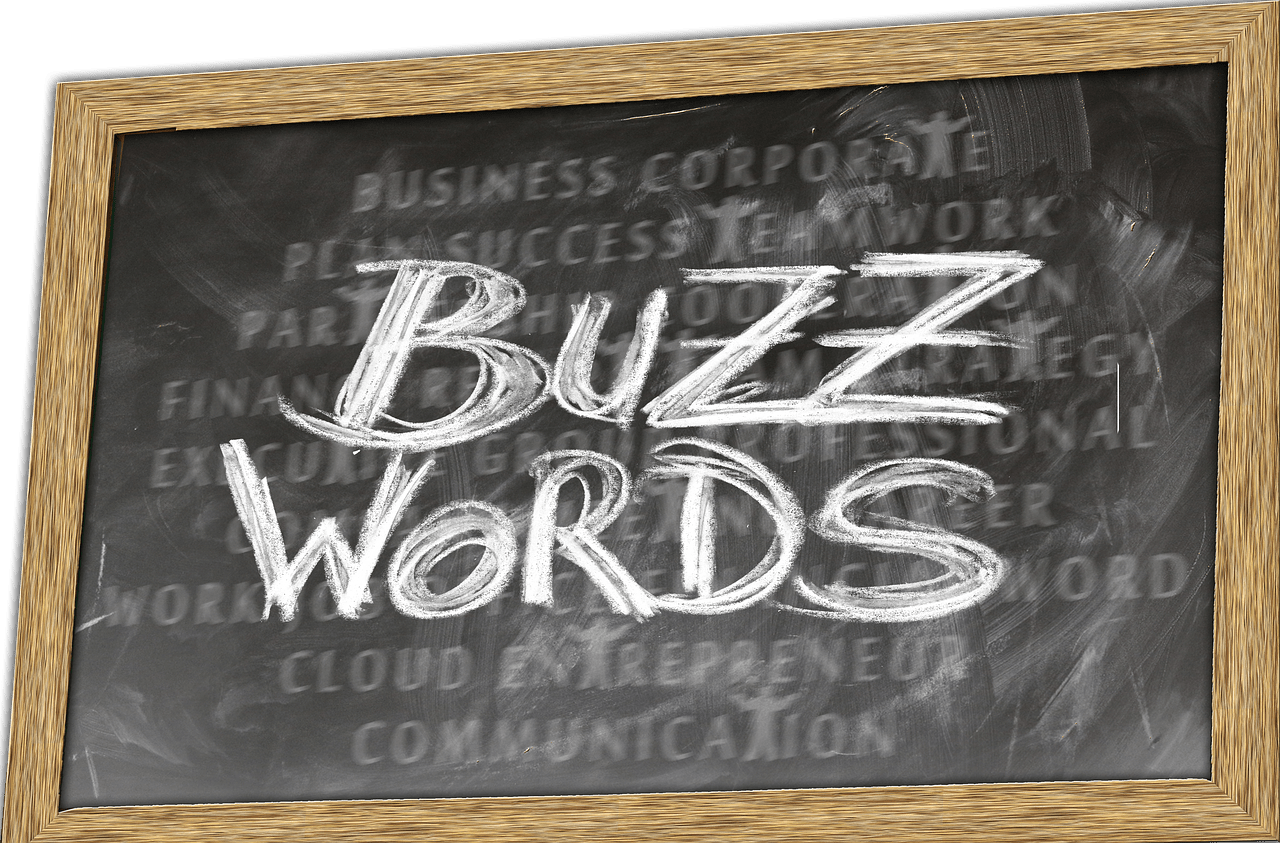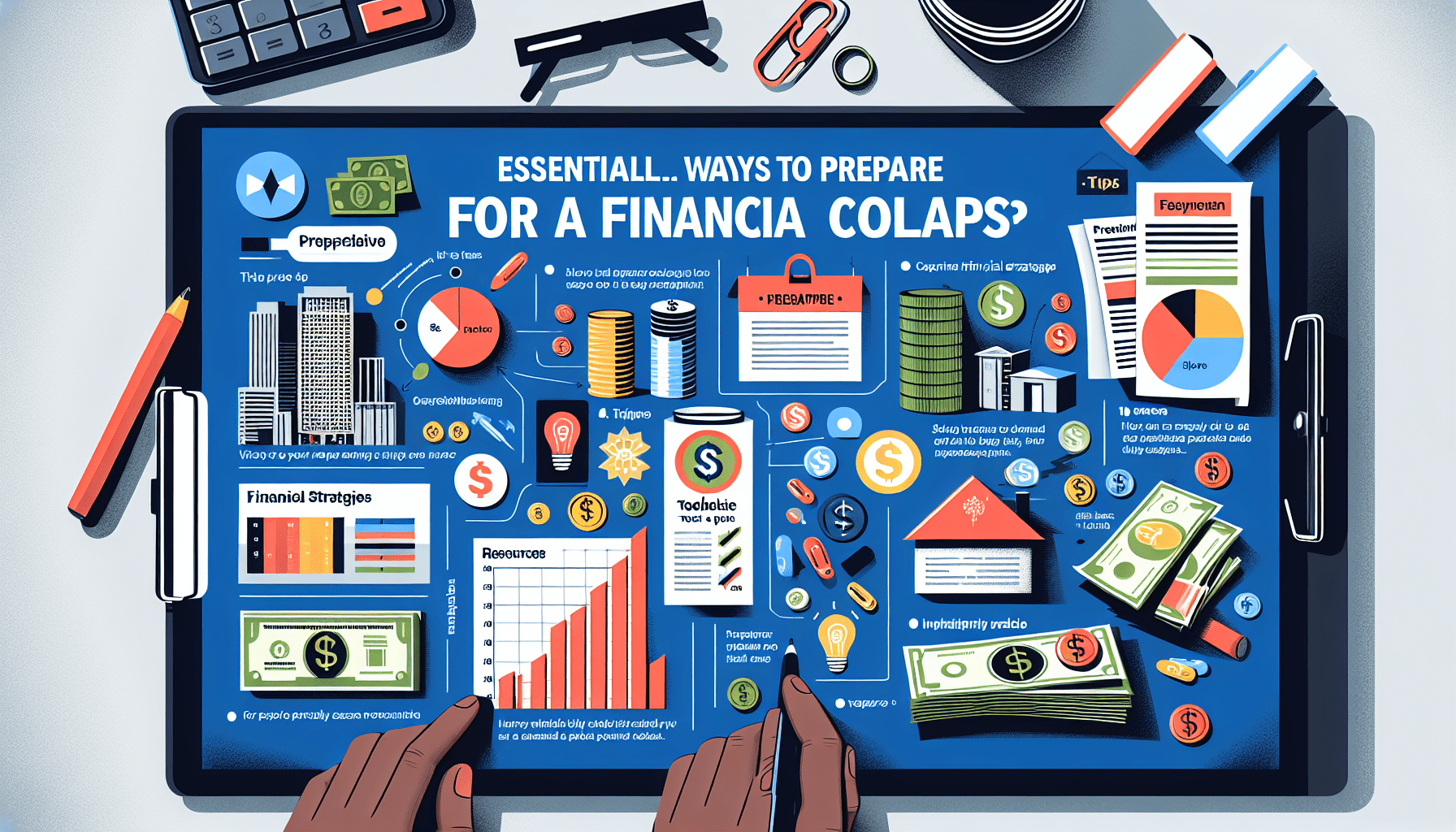In this article, we will explore the top ways for you to prepare for a financial collapse as a prepper. With economic uncertainties and changing times, it’s crucial to be equipped with the necessary knowledge and skills to navigate through potential financial crises. From developing a comprehensive emergency fund to diversifying your investments, we will guide you through practical strategies that will help safeguard your financial well-being. So grab a cup of coffee and get ready to discover how you can proactively protect yourself and your loved ones in the face of uncertain times.

Creating an Emergency Fund
Set a specific savings goal
Creating an emergency fund is an essential step in preparing for any financial uncertainties that may come your way. To start, it’s important to set a specific savings goal. Determine how much money you would need to cover your living expenses for at least three to six months. Take into consideration your monthly bills, mortgage or rent payments, groceries, and any other necessary expenses.
By setting a specific savings goal, you can work towards achieving it in a focused manner. Not only will this provide you with peace of mind knowing that you have a financial safety net, but it will also help you develop good financial habits that can be beneficial in the long run.
Cut expenses and increase income
In order to build your emergency fund, you may need to make some adjustments to your lifestyle. Take a closer look at your expenses and see where you can make cuts. This could mean reducing eating out or entertainment expenses, canceling unnecessary subscriptions, or finding ways to save on your utility bills.
Cutting expenses alone may not be sufficient, especially if you have a high savings goal. Consider ways to increase your income, whether through finding a side gig, taking on freelance work, or exploring other opportunities for additional income. By combining both expense reduction and income increase strategies, you can accelerate the growth of your emergency fund.
Automate your savings
One of the easiest ways to ensure consistent progress towards building your emergency fund is to automate your savings. Set up an automatic transfer from your regular income account to your emergency fund account. This way, a portion of your income will be automatically saved every month without any effort on your part.
Automating your savings has several benefits. It ensures that you prioritize your emergency fund and avoid the temptation to spend the money elsewhere. Additionally, it removes the burden of having to remember to manually transfer funds each month, making the process seamless and hassle-free.
Investing in Precious Metals
Research different types of precious metals
When considering investing in precious metals, it’s important to conduct thorough research on the different types available. Precious metals such as gold, silver, platinum, and palladium all have their own unique characteristics and price fluctuations. Understanding these differences will help you make informed investment decisions.
Research the historical performance of each precious metal, their uses in various industries, and the factors that influence their prices. This will give you a better understanding of how these metals can serve as a store of value and potentially hedge against economic downturns.
Diversify your portfolio
As with any investment strategy, it’s crucial to diversify your portfolio when investing in precious metals. Diversification helps to reduce the risk of overexposure to a single asset class. Consider allocating a portion of your investment portfolio to precious metals to protect against potential market volatility.
By diversifying, you are spreading your investments across different asset classes, which can help you weather financial storms more effectively. Alongside precious metals, consider other investment options such as stocks, bonds, real estate, and mutual funds to create a well-rounded investment portfolio.
Consider storage options
When investing in precious metals, it’s important to consider storage options for your physical holdings. Precious metals can be stored in a variety of ways, including safes, safe deposit boxes, storage facilities, or even offshore vaults.
Evaluate the pros and cons of each storage option to determine the best fit for your needs. Factors to consider include security, accessibility, insurance, and cost. Whichever option you choose, make sure it meets your requirements for safeguarding your precious metals investment.

Stockpiling Essential Supplies
Determine your storage space and needs
Before you start stockpiling essential supplies, it’s crucial to assess your storage space and needs. Consider the available space in your home, whether it’s a dedicated storage area, pantry, or basement. Take into account the size and weight of the supplies you plan to stockpile, and ensure that you have enough space to accommodate them.
Creating an inventory of your existing supplies and estimating future needs will help you determine the quantity of items to stockpile. Keep in mind that you want to have enough to sustain yourself and your family for an extended period, so it’s better to err on the side of caution.
Make a list of essential supplies
To ensure you have everything you need in the event of an emergency, it’s important to make a comprehensive list of essential supplies. Start with the basics, such as food, water, and medical necessities. Consider including items like non-perishable food, water filters, first aid kits, hygiene products, batteries, flashlights, and tools.
Tailor your list to your specific needs and circumstances. If you have pets or infants, for example, make sure to include supplies for them as well. Regularly review and update your list to account for changing needs and expiration dates of perishable items.
Regularly rotate and replenish supplies
Stockpiling essential supplies is not a one-and-done task. To ensure the longevity and usefulness of your stockpile, it’s important to regularly rotate and replenish your supplies. Rotate perishable items such as food and medications to prevent them from expiring.
Create a system for checking and updating your stockpile regularly. This may involve checking expiration dates, conducting inventory audits, or simply keeping a well-maintained record of your supplies. By staying vigilant and proactive, you can ensure that your stockpile remains up-to-date and ready for use.
Developing Survival Skills
Learn basic first aid and medical skills
When it comes to survival, knowing basic first aid and medical skills can be invaluable. Consider taking courses or workshops that focus on basic first aid, CPR, wound care, and medical emergencies. Knowledge of these skills can help you respond effectively to injuries or health crises when medical assistance may be limited or delayed.
Acquiring basic medical skills goes hand in hand with building a well-rounded emergency preparedness plan. It equips you with the knowledge and confidence to provide necessary medical assistance to yourself, your loved ones, or even others in your community during times of crisis.
Acquire self-defense and martial arts knowledge
In uncertain times, personal safety becomes a top priority. Acquiring self-defense and martial arts knowledge can give you an added layer of protection and confidence. Consider taking self-defense classes or martial arts training to learn essential techniques in self-defense, situational awareness, and conflict de-escalation.
By learning self-defense and martial arts, you not only enhance your physical abilities but also develop mental and emotional resilience. These skills can provide you with the confidence to handle challenging situations and protect yourself and your loved ones in times of need.
Master foraging and gardening techniques
In a survival scenario, being able to source your own food becomes essential. Mastering foraging and gardening techniques can give you the skills to find edible plants in the wild and grow your own food.
Research and learn about the edible plants and herbs that are native to your area. Familiarize yourself with their characteristics, harvesting seasons, and preparation methods. Additionally, consider starting a garden or joining a community garden to gain hands-on experience in growing your own food.
By becoming proficient in foraging and gardening, you can supplement your food supply, reduce your dependence on external sources, and increase your self-sufficiency in times of crisis.

Building a Sustainable Food Source
Start a garden or join a community garden
Building a sustainable food source begins with starting a garden or joining a community garden. Gardening allows you to grow fresh vegetables, fruits, and herbs, providing you with a readily available and nutritious food source.
Choose a suitable location in your yard or balcony that receives adequate sunlight and has access to water. Research the specific requirements and planting seasons for different crops in your region. Consider the space available and plan your garden accordingly, ensuring proper spacing between plants for optimal growth.
If you don’t have the necessary space or resources for an individual garden, consider joining a community garden. Not only will this provide access to additional resources and knowledge, but it also fosters a sense of community and collaboration.
Learn about preserving and storing food
To make the most of your sustainable food source, it’s essential to learn about food preservation and storage techniques. Proper preservation ensures that your harvest stays fresh and edible for an extended period.
Research different preservation methods such as canning, freezing, dehydrating, and fermenting. Each method has its own benefits and suitability for different types of food. Experiment with different techniques to find what works best for you and your produce.
Additionally, invest in appropriate storage containers and equipment to maintain the quality of preserved food. Properly labeling and organizing your preserved items will also help you keep track of what you have and ensure that nothing goes to waste.
Raise backyard chickens or start beekeeping
Taking your sustainable food source a step further, consider raising backyard chickens or starting beekeeping. Both chickens and bees can provide valuable resources beyond fruits and vegetables.
Raising backyard chickens can give you a source of fresh eggs and meat. Research local regulations and guidelines for raising chickens, and ensure that you have the necessary space, shelter, and resources to care for them properly.
Beekeeping, on the other hand, allows you to harvest honey and benefit from pollination. Be sure to educate yourself on beekeeping practices, local regulations, and safety guidelines before getting started. Consider joining a local beekeeping association or taking a beekeeping course to further enhance your knowledge and skills.
By incorporating backyard chickens or beekeeping into your sustainable food source, you can diversify your food production and make the most of the resources available to you.
Learning Self-Sufficiency
Become knowledgeable in basic home repairs
Learning basic home repairs is an essential aspect of self-sufficiency. Being able to handle minor repairs and maintenance tasks around your home can empower you to take control of your living environment.
Start by familiarizing yourself with common household tools and their uses. Learn how to tackle simple plumbing issues, fix electrical problems, and perform basic carpentry tasks. This knowledge can help you save money on professional services and ensure that your home remains in good condition.
Additionally, consider investing in a toolbox with essential tools and keeping them organized and easily accessible. Regularly practice your skills by taking on small projects or assisting others in need to build confidence in your abilities.
Learn how to generate alternative power sources
In a time of crisis or economic collapse, access to reliable power sources may become limited. Learning how to generate alternative power sources can help you maintain basic comforts and necessities.
Research different methods of generating alternative power, such as solar panels, wind turbines, and portable generators. Understand the requirements, costs, and benefits of each option to determine the best fit for your needs.
Consider taking courses or workshops on renewable energy systems to gain hands-on knowledge and practical skills. The ability to harness and utilize alternative energy sources can provide you with greater independence and resilience in times of limited or unreliable electricity.
Practice water harvesting and filtration methods
Access to clean water is vital for survival. Learning and practicing water harvesting and filtration methods allows you to secure a reliable supply of safe drinking water.
Research different water harvesting techniques such as rainwater collection, well drilling, or setting up water catchment systems. Understand the legalities and regulations surrounding water harvesting in your area to ensure compliance.
Invest in quality water filtration systems or learn how to build your own filtration devices using readily available materials. Additionally, educate yourself on water purification methods, such as boiling, chemical treatment, or using UV sterilization.
By mastering water harvesting and filtration methods, you can ensure a sustainable and safe water source for yourself and your loved ones.

Forming Community Connections
Join prepper or survivalist groups
Forming connections with like-minded individuals is crucial when preparing for a financial collapse. Join prepper or survivalist groups in your local community or online to meet people who share similar interests and concerns.
These groups often provide a platform for sharing knowledge, exchanging ideas, and organizing community initiatives. Participating in group discussions, attending meet-ups, and engaging in collaborative projects can help you gain valuable insights, learn new skills, and build a support network.
Additionally, being part of a prepper or survivalist group can provide emotional support and a sense of belonging. Connecting with individuals who understand your concerns and motivations can be reassuring and inspiring.
Attend local community meetings and events
Beyond joining specific prepper or survivalist groups, it’s important to engage with your local community on a broader level. Attend local community meetings, events, or workshops to stay informed and connected.
Community meetings often offer opportunities to learn about local initiatives, disaster preparedness plans, and emergency response measures. Engaging in these discussions enables you to contribute your knowledge and skills, as well as learn from the experiences and expertise of others.
By being an active member of your community, you can establish connections and foster a sense of camaraderie. In times of crisis, having established relationships with your neighbors and local authorities can be invaluable.
Establish trust and communication with neighbors
Building trust and establishing effective communication with your neighbors is an essential part of preparing for a financial collapse. Your neighbors can become a valuable resource in times of need, as they are in close proximity and likely facing similar challenges.
Initiate conversations with your neighbors to get to know them better and discuss mutual concerns. Develop a neighborhood communication plan, including contact information and communication channels, in case traditional means of communication are disrupted.
Consider organizing neighborhood meetings or events to foster a sense of community and encourage collaboration. By investing time and effort in building relationships with your neighbors, you can create a support network that strengthens the overall resilience of your community.
Reducing Debt and Simplifying Lifestyle
Create a plan to pay off debts
Reducing debt is a critical step towards achieving financial stability and preparedness. Create a plan to pay off your debts by assessing your financial situation, prioritizing your debts, and developing a repayment strategy.
Start by gathering the necessary information about your debts, including balances, interest rates, and minimum monthly payments. Identify high-interest debts and prioritize them for faster repayment. Consider debt consolidation or refinancing options to simplify your payment process and potentially reduce interest rates.
Develop a realistic budget that allows you to allocate extra funds towards debt repayment. Cut unnecessary expenses, negotiate lower interest rates with creditors, and explore additional income streams to increase your debt repayment capabilities.
Stick to your debt repayment plan and celebrate milestones along the way. As you gradually reduce your debt burden, you’ll gain greater financial freedom and the ability to redirect resources towards important preparedness efforts.
Downsize and eliminate unnecessary expenses
As you work towards financial preparedness, it’s important to assess your lifestyle and identify areas where you can downsize and eliminate unnecessary expenses. Simplifying your life not only reduces financial stress but also allows you to focus on what truly matters.
Evaluate your current living situation and consider downsizing to a more affordable and manageable space. Look for opportunities to reduce or eliminate expenses such as dining out, subscription services, or excessive leisure activities.
Opt for a minimalist lifestyle by focusing on experiences rather than material possessions. Embrace a frugal approach by finding joy in simple pleasures and practicing mindful spending. By eliminating unnecessary expenses and downsizing your life, you can allocate more resources towards emergency preparedness and building a secure financial foundation.
Practice minimalism and frugality
Practicing minimalism and frugality can be a powerful way to prepare for a financial collapse. Minimalism encourages you to prioritize what truly brings value and eliminate clutter from your life. Frugality emphasizes mindful spending and finding alternative ways to meet your needs.
Adopting a minimalist mindset helps you focus on essential items and experiences, reducing the need for excessive consumption. Consider decluttering your home regularly, keeping only items that serve a purpose or bring genuine joy. This not only frees up physical space but also cultivates a sense of contentment and appreciation for what you have.
Frugality involves making deliberate choices about how you allocate your resources. Seek ways to save money on everyday expenses, such as grocery shopping, transportation, and entertainment. Embrace DIY projects, secondhand shopping, and resourceful habits that help you live within your means.
By practicing minimalism and frugality, you can build resilience, increase your financial preparedness, and cultivate a simpler, more fulfilling lifestyle.

Educating Yourself on Economic Systems
Study historical financial collapses
Educating yourself on historical financial collapses can provide valuable insights into the patterns and consequences of economic downturns. Research key events such as the Great Depression, the 2008 financial crisis, or the recessions of previous decades.
Study the causes, impacts, and recovery processes of these financial collapses. Look for patterns and lessons that can be applied to your own preparedness efforts. Understanding the historical context and consequences of financial crises can help you make informed decisions and better navigate future uncertainties.
Books, documentaries, and online resources are abundant sources of information on this topic. Dive into the subject matter, and don’t be afraid to explore differing perspectives to gain a well-rounded understanding.
Read books on economics and investment strategies
In addition to studying historical events, reading books on economics and investment strategies can help you develop a deeper understanding of the financial world and make informed decisions. Look for reputable authors and experts who offer insights into economic systems, investment principles, and risk management.
Books on personal finance, investing, and economic theory will expand your knowledge base and provide practical guidance. Explore topics such as asset allocation, diversification, risk management, and long-term investment strategies.
Consider reading classic financial literature and contemporary works to gain different perspectives. Seek out recommendations from trusted sources or join book clubs that focus on financial and economic topics to foster ongoing learning and discussion.
Stay updated on current economic news
To stay informed and adapt your preparedness strategy accordingly, it’s essential to stay updated on current economic news. Regularly follow trusted news sources that cover financial markets, economic indicators, and global trends.
Keep a close eye on inflation rates, interest rate changes, stock market movements, and geopolitical events that may impact the economy. Understand the potential implications of these factors on your financial preparedness plans and make adjustments as needed.
Consider subscribing to financial newsletters, joining online forums, or following reliable economic analysts to gain insights from experts in the field. By staying informed about the economic landscape, you can make proactive decisions and stay ahead of potential risks.
Developing a Barter System
Identify valuable skills or items for trade
Developing a barter system can be a practical way to navigate a financial collapse or economic crisis. Start by identifying valuable skills or items that you can offer for trade. Consider your strengths, hobbies, or professional expertise that may be in demand during difficult times.
Skills such as carpentry, plumbing, gardening, or medical knowledge can be highly valuable in a barter system. Alternatively, you may possess valuable resources such as surplus food, water, or tools that others may need.
Evaluate the needs and preferences of your community or network. Understand what goods or services are likely to be in high demand and align your offerings accordingly. Being adaptable and open to expanding your skill set can increase your value in a barter system.
Establish a network of trusted individuals
Building a network of trusted individuals is essential for a successful barter system. Seek out individuals who have complementary skills or resources and establish mutually beneficial relationships.
Start by reaching out to like-minded individuals within your community, prepper groups, or local organizations. Collaborate on projects, share knowledge, and build trust over time. By working together, you can provide support and create a more sustainable and resilient network.
Establish clear guidelines and communication channels within your barter network. Define the terms of trade, establish a system of value, and ensure fairness and transparency in all transactions. Building a network based on trust and cooperation is key to formulating a robust barter system.
Practice negotiation and bartering skills
To effectively participate in a barter system, it’s important to practice negotiation and bartering skills. Negotiation allows you to secure favorable terms and reach agreements that benefit all parties involved.
Research negotiation techniques and strategies to enhance your skills. Learn about the art of compromise, finding win-win solutions, and effective communication during negotiations. Practice these skills in various scenarios to build confidence and find your negotiating style.
Additionally, familiarize yourself with common bartering practices and etiquette. Understand the principles of fair trade, proper valuation of goods or services, and respectful communication. By being well-prepared and skilled in negotiation and bartering, you can maximize the benefits of a barter system and thrive during challenging economic times.
In conclusion, preparing for a financial collapse requires taking proactive steps to protect your financial well-being, develop necessary skills, and build a resilient community network. By creating an emergency fund, investing in precious metals, stockpiling essential supplies, developing survival skills, building a sustainable food source, learning self-sufficiency, forming community connections, reducing debt and simplifying your lifestyle, educating yourself on economic systems, and developing a barter system, you can increase your preparedness for uncertain times. Remember, it’s essential to take a comprehensive approach and continually adapt your strategies as you navigate the ever-changing and unpredictable landscape of the modern world.
